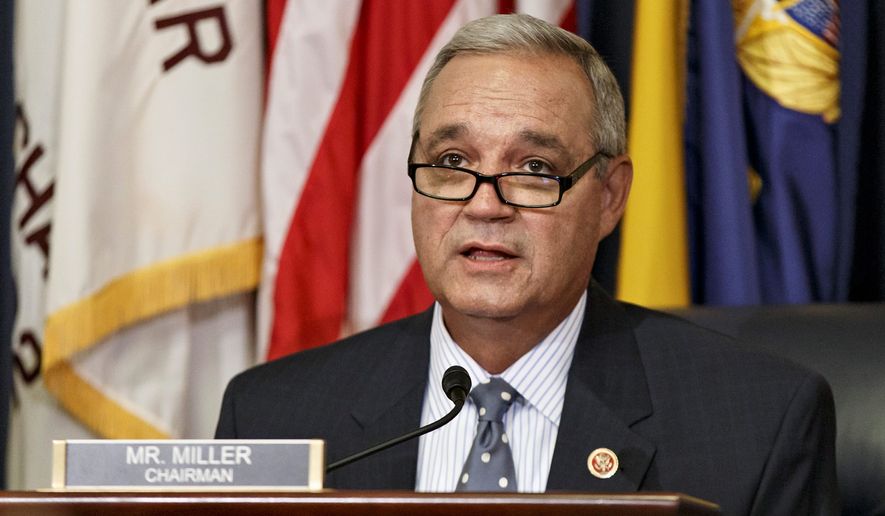The House Committee on Veterans’ Affairs voted Wednesday to issue subpoenas to five VA officials to testify about their role in the agency’s relocation program, which paid excessive benefits to get senior department officials to switch offices.
Each of the five had refused a request to testify voluntarily, leading the committee to issue its first-ever subpoenas demanding witnesses appear before the panel.
“I assure you that I have not come to this decision lightly,” Committee Chairman Jeff Miller, Florida Republican, said.
The committee voted to subpoena Danny Pummill, the department’s principal deputy undersecretary for benefits; Diana Rubens, director of the Veterans Benefits Administration’s offices in Philadelphia and Wilmington, Delaware; Robert McKenrick, director of the VBA’s Los Angeles office; Kimberly Graves, director of the St. Paul, Minnesota, office, and Antoine Waller, director of the Baltimore office.
A government watchdog investigation found that Ms. Rubens and Ms. Graves orchestrated their transfers to their current posts after pressuring Mr. McKenrick and Mr. Waller to move out of the Philadelphia and St. Paul offices, respectively.
The committee has also asked former Undersecretary for the Veteran Benefits Administration Allison Hickey to come to the hearing as a private citizen. Her resignation Friday became effective Monday, two days before the hearing — a timing Mr. Miller called “suspect.” The committee was calling Mr. Pummill in Ms. Hickey’s place.
The VA spent about $300,000 in relocation costs in Ms. Rubens’ case and more than $100,000 in Ms. Graves’ situation.
VA Deputy Inspector General Linda Halliday said the moves were so egregious that she notified the Department of Justice that criminal charges might be appropriate for the two employees.
Ms. Hickey was implicated in the watchdog report for agreeing to help Ms. Rubens get the transfer she desired.
Ms. Rubens, Ms. Graves and Mr. Pummill are all active employees.
Relocation costs are usually only paid to employees when their transfer was ordered by the agency, they were forced to move more than 50 miles, and they were the best qualified applicants for a job that was difficult to fill.
But Ms. Rubens and Ms. Graves wanted the transfers and manipulated Mr. McKenrick and Mr. Waller into taking up other posts, Ms. Halliday said. The Philadelphia position had more than 100 candidates.
“Relocation should not have been paid,” Ms. Halliday said.
Her report also found that senior VA managers often were offered salary increases beyond their job descriptions as inducement to transfer to less desirable posts. In these cases, as Ms. Rubens and Ms. Graves had voluntarily gone to their new posts — to be closer to family, Mr. Miller alleged — they should not have received salary increases.
Mr. Miller said he invited the witnesses to appear Wednesday “to go over the facts of the report — not to determine their innocence or guilt. It’s as simple as that.”
“There is ample evidence that VA does not move quickly when it comes to accountability,” Mr. Miller said. “We have seen time and time again that if we do not aggressively shed light on issues we uncover, the IG uncovers or whistleblowers uncover, then often VA will just sweep them under the rug for an extended period of time and wait for public attention to go elsewhere.”
VA Deputy Secretary Sloan Gibson wrote a letter to Mr. Miller saying it wouldn’t be appropriate for the employees at the heart of the scandal to speak to the committee considering the investigations into their conduct. He offered to testify on their behalf because he did not want them to implicate themselves and violate their constitutional right against self-incrimination while speaking to the committee.
“In this matter as in all cases of alleged senior leader wrongdoing, we will do the right thing, but we have to do it in the right way,” Mr. Gibson wrote. “We must first let DOJ complete its review.”
The VA is looking into whether it can recover any of the relocation money from the employees, Ms. Halliday said.
• Dave Boyer can be reached at dboyer@washingtontimes.com.
• Anjali Shastry can be reached at ashastry@washingtontimes.com.




Please read our comment policy before commenting.